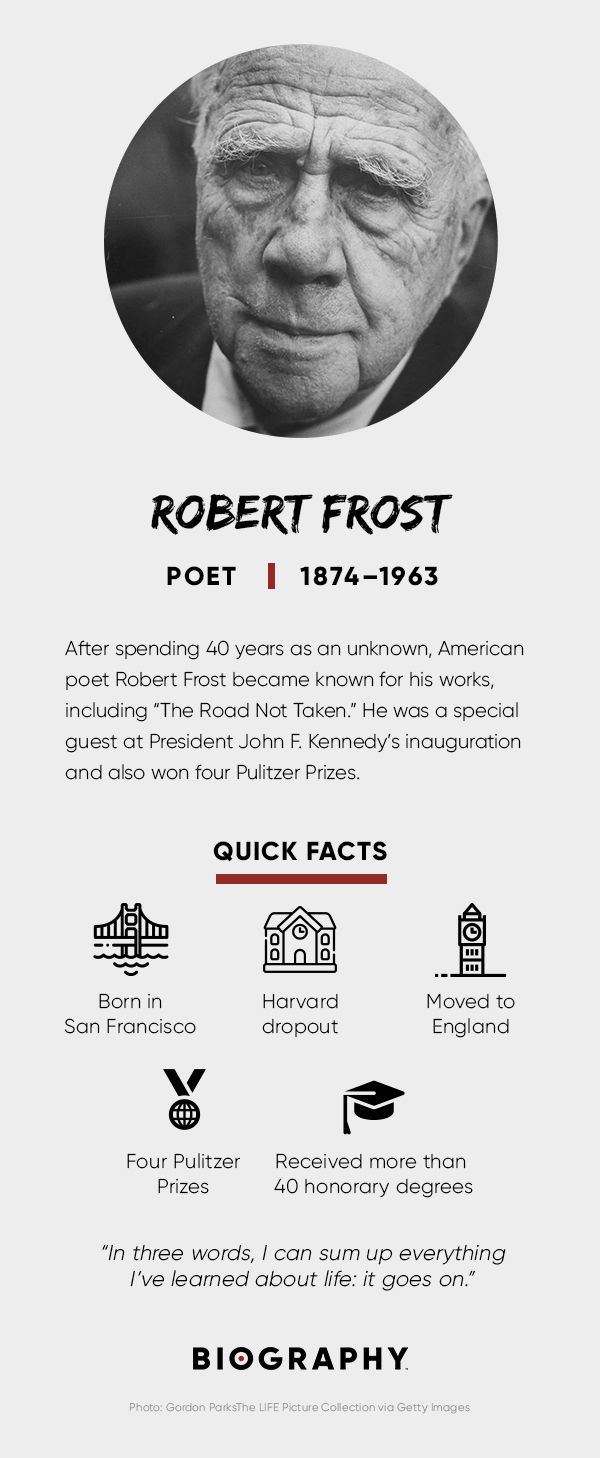Robert Frost was an influential American poet born on March 26, 1874. His work often explored themes of rural life and nature.
Acclaimed for his realistic depictions and his command of American colloquial speech, Robert Frost remains a celebrated figure in literature. He crafted poems that resonate with themes of complexity in human and natural environments, earning four Pulitzer Prizes during his lifetime.
Frost’s mastery in poetry is evident in works like “The Road Not Taken” and “Stopping by Woods on a Snowy Evening,” which have secured his place in the canon of American literature. His legacy is not just in the awards he won, but in his ability to communicate profound ideas through simple, yet layered verse. Readers and critics alike continue to explore Frost’s clever use of imagery and symbolism, creating a timeless relevance to his poetry that transcends generations.
Early Life And Family Background Of Robert Frost
The early days of the celebrated poet Robert Frost were steeped in the vibrant milieu of San Francisco. Born into a family where art and education were revered, his upbringing played a pivotal role in shaping his poetic voice. This section delves into Frost’s formative years and the familial influences that tinted his literary canvas.
Birth And Childhood In San Francisco
On March 26, 1874, Robert Lee Frost was born to William Prescott Frost, Jr., and Isabelle Moodie. Frost’s childhood in San Francisco was marked by the tragic loss of his father at a young age. This event prompted the family to move across the country to Massachusetts, an area that would later greatly influence his poetry. His early education in Lawrence instilled in him a love for reading and writing, anchoring the beginnings of his future in literature.
Family Ties And Influences On His Poetry
- His mother, Isabelle, was a Scottish immigrant with a passion for teaching. She introduced young Robert to the world of books.
- His father, William, was an editor, teacher, and politician whose outspoken personality and own creative endeavors left an imprint on Frost’s early life.
- The move to New England after his father’s death was a turning point, exposing Frost to rural landscapes that would later populate his poems.
- Personal loss and hardship, including the untimely death of his sister Jeanie Florence, fed into his reflective and often somber lyrical themes.
- His grandfather’s purchase of a farm for Robert and his family ensured a close tie to the natural world, a connection that would prove central to his work.
Education And Early Writings
Robert Frost is one of the most influential poets in American history. Understanding his early life, especially his education and initial writings, is key to grasping how he became a literary icon.
Dartmouth And Harvard Experiences
Robert Frost’s journey in academia began at Dartmouth College. Yet, his tenure there was short, a mere few months. He then moved to Harvard University. Frost studied liberal arts at Harvard for two years. Despite showing promise, personal challenges led to his departure without a degree. These top institutions helped shape his literary path.
The Struggle Of Balancing Work And Passion
After leaving Harvard, Frost faced a tough reality. He juggled various jobs to support his family. Jobs ranged from teaching to cobbler work. Through this, his burning passion for poetry remained. He squeezed writing into his busy life. These efforts laid the groundwork for his future success.
Personal Tragedies And Poetic Beginnings
The life of Robert Frost, much like his poetry, is a tapestry woven with threads of joy and sorrow. Personal hardships often shadowed his early years, but these experiences also cultivated a profound foundation for his poetic voice. Through the lens of Frost’s personal tragedies and his emergence as a poet, we explore the complexity and resilience that marked his path.
The Impact Of Personal Losses
Robert Frost faced many dark moments that deeply touched his life and work. The loss of loved ones became a recurrent theme in both his history and his poetry. Frost’s father died when Frost was just eleven, leaving the family in financial distress. The poet also knew the sharp sting of losing children, with several of his six children dying early. His beloved wife, Elinor, faced a battle with heart disease that ultimately ended in her untimely death. These impactful events shaped Frost’s perspective on life and mortality, themes that surface frequently in his poetry.
First Published Poem And Initial Recognition
The year 1894 marked a turn in Frost’s life when The New York Independent accepted his poem “My Butterfly.” This moment of acknowledgment fueled Frost’s ambition to pursue poetry against all odds. He experimented with different jobs but always returned to his writing. In 1912, Frost sold his farm and took his family to England, where he could dedicate himself wholly to his craft. It was there that Frost published his first collection, ‘A Boy’s Will’, and began to gain international recognition. Much of Frost’s early work was characterized by a reflection on nature, rural life, and personal tragedy, elements that later readers would grow to cherish.

Credit: www.britannica.com
Move To England And Meeting The Modernists
The chapter of Robert Frost’s life that takes us across the Atlantic is as fascinating as it is pivotal. In 1912, seeking a haven for his poetry, Frost moved to England, where modernist waves were reshaping the literature landscape. This period was crucial; it marked a significant evolution in his work and personal life.
Adopting New Surroundings
Robert Frost embraced England with open arms. The rural landscape echoed the New England countryside he so loved. This new backdrop was the perfect catalyst for his creative process. It also offered a vibrant literary scene, ripe with opportunity.
- Frost published his first two books in England.
- His work gained critical acclaim overseas before the US.
Relationship With Ezra Pound And Other Contemporaries
The move introduced Frost to influential modernist poets. Ezra Pound, an eminent figure in modernist poetry, became an advocate for Frost’s work.
Frost and Pound formed a mutually respectful bond. Pound’s support was instrumental in promoting Frost’s poetry. This helped Frost establish himself among notable literary figures of the time.
| Contemporary | Interaction with Frost |
|---|---|
| Ezra Pound | Provided crucial support for Frost’s work |
| Edward Thomas | Became a close friend and an inspirational figure |
| Rupert Brooke | Part of the literary circle Frost engaged with |
Moreover, friendships with Edward Thomas and others enriched Frost’s personal and professional life. These interactions were vital, influencing his work and establishing his legacy.
Major Works And Literary Accomplishments
Robert Frost stands tall among 20th-century poets. His vivid imagery and deep themes woven into simple, rural scenes captured readers’ imaginations. As we peel back the layers of Frost’s legacy, his major works and numerous accolades come into focus. These milestones shaped American poetry and secured his place in literary history.
Publishing ‘a Boy’s Will’ And ‘north Of Boston’
Robert Frost’s literary journey began with ‘A Boy’s Will.’ This debut collection, published in 1913, introduced Frost’s potential as a master of verse. ‘A Boy’s Will’ analyzes the complexities of youth with heartfelt emotion.
The follow-up, ‘North of Boston,’ released in 1914, solidified his reputation. This collection features some of his most famous poems, like “Mending Wall” and “After Apple-Picking.” Frost’s portrayals of New England farm life resonated with readers worldwide.
Pulitzer Prizes And Noteworthy Contributions
Frost’s excellence did not go unnoticed. He was awarded four Pulitzer Prizes for poetry—a testament to his skill and influence. His recognized works include:
- ‘New Hampshire’ (1924)
- ‘Collected Poems’ (1931)
- ‘A Further Range’ (1937)
- ‘A Witness Tree’ (1943)
Beyond these accolades, Frost’s contributions to literature extend to his profound teaching roles and public readings, influencing minds and touching hearts.
Influence Of New England On Frost’s Work
Robert Frost, a luminary in American poetry, drew profound inspiration from the cradle of New England. His poetic works resonate with the spirit and landscapes of this northeastern corner of the United States. Frost’s connection to this land runs deep, imprinting his verses with a sense of place and time that is both universal and distinctly regional. Let’s explore the profound impact New England had on Frost’s work.
Nature And Rural Life As Central Themes
Robert Frost’s poetry is renowned for its vivid portrayal of nature. One can almost feel the crisp New England air or hear the rustling leaves just by reading his words. The natural world was not just a backdrop for Frost but a central character in his narratives. This reverence shows up in many of his works.
- “Stopping by Woods on a Snowy Evening” captures the silent beauty of a snowy woodland.
- (“Birches”) illustrates the playful dance of trees swaying in the wind.
- “The Road Not Taken” presents nature as a metaphor for life’s choices.
Frost’s rural themes are a declaration of his love for the bucolic settings of New England, celebrating the simplicity and hardship of rural life.
Depiction Of New England Character
Beyond landscapes, Frost delves into the human element of New England, introducing readers to the region’s people. His works paint clear pictures of the New England character—hardworking, resilient, and steeped in tradition.
| Poem | Depiction of New England Character |
|---|---|
| “Mending Wall” | Explores themes of boundaries and neighborliness. |
| “The Death of the Hired Man” | Portrays themes of forgiveness and social expectation. |
| “Home Burial” | Delves into the complexities of grief in family dynamics. |
Each poem stands as a testament to Frost’s ability to convey not just a scene but the soul of New England’s folk.
Robert Frost’s Philosophy And Style
The poetry of Robert Frost marries traditional form with modern insight. His works reflect a mastery of classical verse while delving into the complexities of human experience. We will explore how Frost’s style and philosophical approach set him apart as a profound and enduring voice in American literature.
Use Of Traditional Verse Forms
Frost’s adherence to traditional verse forms such as sonnets, and villanelles, is noteworthy. His skillful use of rhyme and meter creates a familiar musicality.
- Rhymed stanzas
- Structured syllabic patterns
- Consistency in form mirrors the timeless aspects of nature, a common theme in his poetry.
Frost’s classic technique served as a vessel for his innovative thought. It strikes a balance between the old and the new.
Philosophical Underpinnings Of His Work
Frost’s work is deeply philosophical, pondering life’s mysteries and the human condition. His poems often present a quiet contemplation or a startling epiphany about nature and existence.
- Exploration of individuality versus the collective experience.
- Interplay between nature’s beauty and its indifference.
- Life’s inherent struggles and triumphs.
This philosophical depth gives his poetry a timelessness that continues to resonate with readers. Frost’s poetry serves as a lens through which we can explore our own lives.

Credit: www.biography.com
Legacy And Impact On American Literature
Robert Frost, a literary icon, has left a lasting legacy in the heart of American literature. His profound verse continues to resonate with readers and critics alike. His contributions are not just in his own works but also through shaping the skills and aesthetics of numerous writers he influenced. Frost’s straightforward talk in poetry broke new ground for what American literature would come to be.
Teaching And Inspiring Future Generations
Frost’s role as an educator had a significant ripple effect. His stints at Amherst College and University of Michigan allowed him to mold young minds. As a beloved instructor, he provided a beacon of inspiration. Students carried his teachings far beyond the classroom walls.
- Inspiring a love for poetry among students.
- Encouraging critical thinking and literary analysis.
- Leaving behind a treasure trove of writings and lectures on poetry.
Frost’s Enduring Presence In American Culture
Robert Frost’s poetry is a mainstay in American culture. His themes of nature, rural life, and human emotion are deeply engrained in the American psyche. His famous lines are quoted in everything from books to films and political speeches. Frost’s work has woven itself into the fabric of American thought.
| Contribution | Impact |
|---|---|
| Poetic Works | Study material in schools and universities |
| Popular Quotations | Cultural reference points |
| Lyrical Beauty and Simplicity | Endearing to all ages |
His influence persists, shaping perspectives and sparking reflection. The name Robert Frost is synonymous with excellence in poetry, a testament to his enduring impact. His verse stands as a shining example of the power of words, and his legacy is poised to inspire for generations to come.

Credit: en.wikipedia.org
Conclusion
Robert Frost’s literary journey reflects life’s complexities through his profound poetry. His legacy, entrenched in the annals of American literature, continues to inspire generations. Exploring his story uncovers the resilience behind his celebrated works. As we turn the page on his biography, Frost’s words resonate, urging us to find meaning in the roads not taken.





